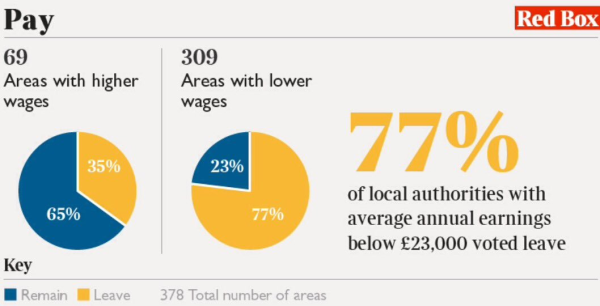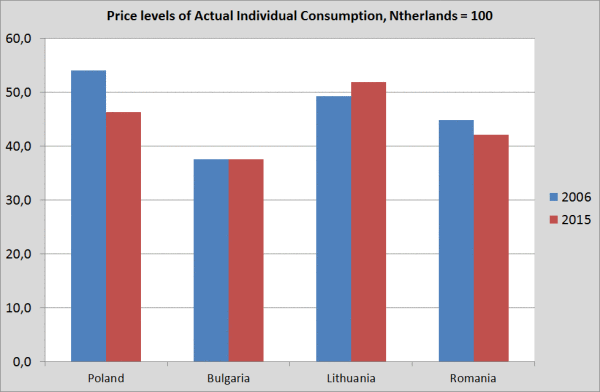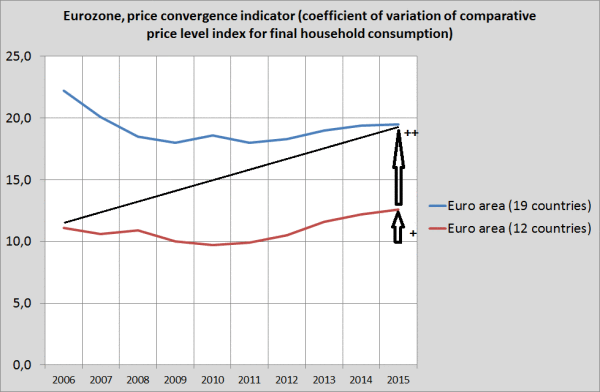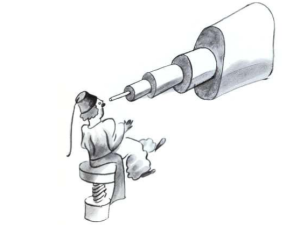Graph 1. Wage levels and vote shares, Brexit. Brad deLong is very annoyed about this Voxeu piece by a whole slew of famous economists, which advises that we, as a consequence of Brexit, have to double down on the Euro. Full disclosure: the piece is also signed by Brad’s academic Bossom Buddy Barry Eichengreen. I agree with the gist and arguments of the piece of deLong: “From my perspective, this piece at Vox.eu makes many too many bows to conventional-wisdom idols with not just feet but bodies and heads of clay” (for younger readers: consult for ‘feet of clay’ the bible book Daniel 2:31-45). Do I also have something to add? Yes. (A) The economists in question do not seem to be particularly well-informed about (changes in) relative price levels in the EU. (B) Their macro-economics is outdated. And (C) they do not grasp the problem: structural EU change is, at least for large parts of the population, the problem and not the solution. Let me explain (to underscore that macro is about people and families I’ll start with a personal observation). Yesterday evening I found myself at a parking place along the A7 highway, half way between Groningen and Drachten. Rain. There were four trucks: one from Lithuania, one from Romania, one from Poland and one from Bulgaria. Two of these trucks were ostensibly driving for ‘western’ companies, one from Denmark and one from the Netherlands.
Topics:
Merijn T. Knibbe considers the following as important: Uncategorized
This could be interesting, too:
tom writes The Ukraine war and Europe’s deepening march of folly
Stavros Mavroudeas writes CfP of Marxist Macroeconomic Modelling workgroup – 18th WAPE Forum, Istanbul August 6-8, 2025
Lars Pålsson Syll writes The pretence-of-knowledge syndrome
Dean Baker writes Crypto and Donald Trump’s strategic baseball card reserve
Graph 1. Wage levels and vote shares, Brexit.
Brad deLong is very annoyed about this Voxeu piece by a whole slew of famous economists, which advises that we, as a consequence of Brexit, have to double down on the Euro. Full disclosure: the piece is also signed by Brad’s academic Bossom Buddy Barry Eichengreen. I agree with the gist and arguments of the piece of deLong: “From my perspective, this piece at Vox.eu makes many too many bows to conventional-wisdom idols with not just feet but bodies and heads of clay” (for younger readers: consult for ‘feet of clay’ the bible book Daniel 2:31-45). Do I also have something to add? Yes. (A) The economists in question do not seem to be particularly well-informed about (changes in) relative price levels in the EU. (B) Their macro-economics is outdated. And (C) they do not grasp the problem: structural EU change is, at least for large parts of the population, the problem and not the solution. Let me explain (to underscore that macro is about people and families I’ll start with a personal observation).
Yesterday evening I found myself at a parking place along the A7 highway, half way between Groningen and Drachten. Rain. There were four trucks: one from Lithuania, one from Romania, one from Poland and one from Bulgaria. Two of these trucks were ostensibly driving for ‘western’ companies, one from Denmark and one from the Netherlands. ‘Fast backward’ to 1985. A friend and I hitchhiked to Barcelona with two of such trucks, which were transporting pigs to Spanish slaughterhouses. In those days the Spanish market had just been opened up for Dutch farmers and there was a kind of pig-export bonanza. According to the truckers international transport was one of the very few legal ways for people like them, with little formal education, to earn a lot of money. One of them however bitterly complained about the (EU) regulations imposed by Neelie Smit-Kroes, a former Dutch transport minister, which had forced ‘self employed’ truck drivers out of business and which had forced him to become a wage earner. The work involved long hours and being separated from your family (their main concern) – but earned big bucks.
That was then. Nowadays, drivers living in countries with much lower average macro-economic price levels (source: Eurostat) compete with Dutch (and Belgian and British and…) drivers. A situation designed and enforced by bureaucrats from Brussels. And as the price level in the home countries of these drivers, were their families live and spend, is so much lower than the Dutch (and Belgian and…) price level (graph 2) there is just no way Dutch drivers can compete (specialized trucking services as well as deliveries from Dutch to Dutch companies are still handled by Dutch drivers, this is about international transport). Which means that employment of Dutch international truck drivers has declined, as have their incomes (aside – even in 1985 becoming an international truck driver did involve considerable practical as well as theoretical education).
Graph 2. Comparable price levels of Actual Individual Consumption (includes individual government services like education). Source: Eurostat.
As such, this is just the usual story about competition and dynamic change of the economy which leads to lower costs and lower prices for consumers which, as neoclassical macro assumes that we’re having full employment at (almost) all times, means that we’re happier ever after. But is this story right? Between 2006 and 2015 there has been no convergence of price levels (graph 2). The ‘usual’ story also implies that competition will also lead to a convergence of price levels. But that’s not what happened and happens. This conclusion does not only hold for the countries of graph 2, but also for the entire EU and even the Eurozone. Especially after 2008 differences between countries increased. And differences in the entire Eurozone even increased dramatically, because of the inclusion of new members. These are, admittedly, pretty small countries like Lithuania and Estonia. But even then there is no convergence – people like our truck Dutch truck-drivers are getting blow after blow after blow – even when countries like Estonia have, recently, witnessed dramatic increases of minimum and other wages. To me, it seems that populists like Farage, Le Pen and Wilders do have a point. Not everybody is living happier after enlargements of the EU and the Eurozone. And, more important – there are no signs of improvement. I do not expect that people voting for Brexit were aware of these price level data (the Voxeu economists do not seem to be aware of them…). But they are somehow very aware of the role of of bureaucrats from Brussels. And the consequences of their designs for changes in the differences between Eurozone price levels. Maybe even more so than the important economists.
Graph 3. Differences in price levels, Eurozone 12 and Eurozone 19, final household consumption (excludes individual government services). Source: Eurostat.
Another addition to te piece of Brad deLong: he does mention the velocity of money. But it would have been clearer to invoke the new macro, which acknowledges that the housing market is (by far) the most important asset market of them all, as well as (by far) the most important collateral and debt generator of the economy. The original Voxeu piece does talk about banks but leaves, when it comes to debts and credits, households and companies entirely off the table and the same for the housing market. Additions to macro-economics like balance sheet recessions, the importance of mortgages on the balance sheets of banks and, hence, for money creation and the volatile nature of the housing (and hence the credit) markets deserve more attentioin than just a remark about the velocity of money. But Brad at least mentions that. The Voxeu piece totally ignores it. Just like the understandable grievances of the ‘losers’ from free capital and labour markets. To these, the piece will sound as more of the same problem, instead of as a solution. Brad deLong argues for more utopian frenzy. Bu that should not just be about Euro-institutions, important as they are. We also need that ‘Europe-feeling’. So, from ‘Le Petit Prince‘ and about the Voxeu post (lisez toute la piece!):
“J’ai de sérieuses raisons de croire que la planète d’où venait le petit prince est l’astéroïde B 612. Cet astéroïde n’a été aperçu qu’une fois au télescope, en 1909, par un astronome turc. Il avait fait alors une grande démonstration de sa découverte à un Congrès International d’Astronomie. Mais personne ne l’avait cru à cause de son costume.
Les grandes personnes sont comme ça. Heureusement pour la réputation de l’astéroïde B 612 un dictateur turc imposa à son peuple, sous peine de mort, de s’habiller à l’Européenne. L’astronome refit sa démonstration en 1920, dans un habit très élégant. Et cette fois ci tout le monde fut de son avis.Si je vous ai raconté ces détails sur l’astéroïde B 612 et si je vous ai confié son numéro, c’est à cause des grandes personnes. Les grandes personnes aiment les chiffres. Quand vous leur parlez d’un nouvel ami, elles ne vous questionnent jamais sur l’essentiel. Elles ne vous disent jamais: «Quel est le son de sa voix? Quels sont les jeux qu’il préfère? Est-ce qu’il collectionne les papillons?» Elles vous demandent: «Quel âge a-t-il? Combien a-t-il de frères? Combien pèse-t-il? Combien gagne son père?». Alors seulement elles croient le connaître. Si vousdites aux grandes personnes: «J’ai vu une belle maison en briques roses, avec des géraniums aux fenêtres et des colombes sur le toit…» elles ne parviennent pas à s’imaginer cette maison. Ilfaut leur dire: «J’ai vu une maison de cent mille francs.» Alors elles s’écrient: «Comme c’est joli!»”

